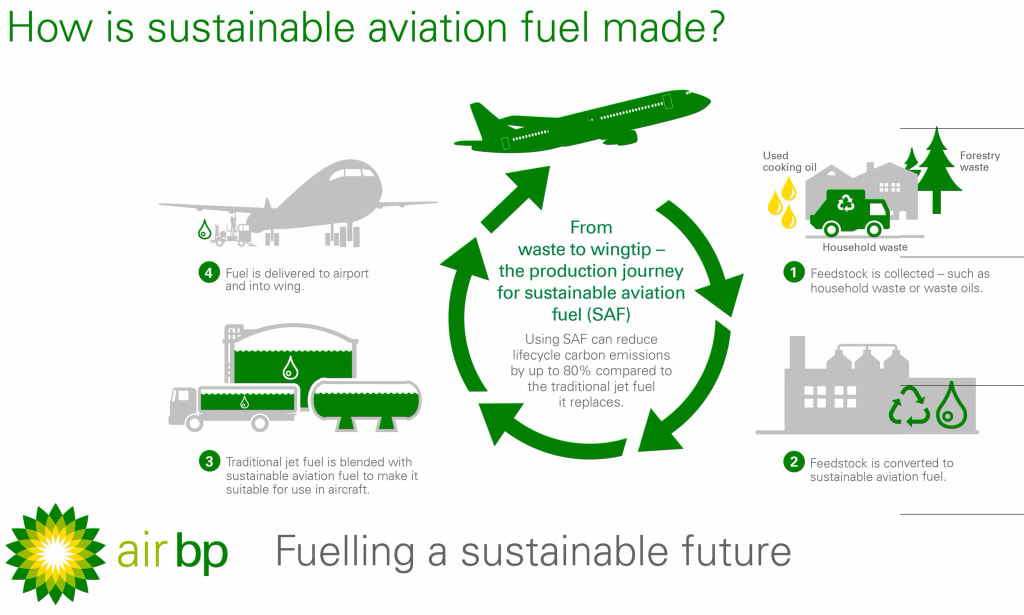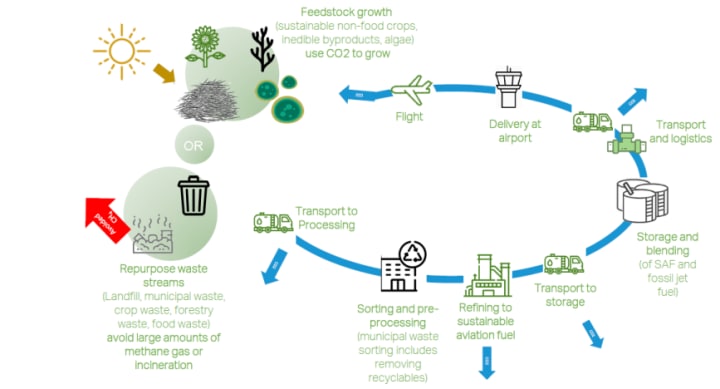Sustainable Aviation Fuels
Sustainable aviation fuel (SAF) is a non-conventional fuel that is used in the aviation industry.

What is SAF?
Sustainable aviation fuel (SAF) is a non-conventional fuel that is used in the aviation industry. It is the preferred term used by IATA to describe this type of fuel. Other terms used to refer to SAF include sustainable alternative fuel, sustainable alternative jet fuel, renewable jet fuel, or bio-jet fuel. These terms are generally used to convey the same meaning. It is important to note that biofuels refer to fuels produced from biological resources such as plant or animal material, but current technology allows fuel to be produced from other alternative sources. The chemical and physical properties of SAF are almost identical to those of conventional jet fuel, and they can be safely mixed with the latter to varying degrees. SAF is a drop-in fuel, which means it can be easily incorporated into existing airport fueling systems and does not require the adaptation of aircraft or engines. To be considered “sustainable,” SAF must meet sustainability criteria such as lifecycle carbon emissions reduction, limited fresh water requirements, no competition with needed food production, and no deforestation.
Sustainable aviation fuel consists of three key elements:
- Sustainable
- Alternative feedstock to crude oil.
- Fuel
1. Sustainability means using resources in a way that meets economic, social, and environmental goals without harming nature. SAF is a type of biofuel used to power airplanes. It is similar to regular jet fuel but has a smaller carbon footprint. Depending on how it is made, SAF can reduce greenhouse gas emissions compared to regular jet fuel. Some SAF methods can even have a net-negative greenhouse gas footprint. SAF is important because it can help reduce greenhouse gas emissions from airplanes. Airplanes are responsible for 9%–12% of transportation greenhouse gas emissions in the US, according to the US Environmental Protection Agency.
2. It is a fuel for aviation with an alternative feedstock (raw material from which fuels are produced) to crude oil. Sustainable Aviation Fuel (SAF) is an alternative to traditional jet fuel that is derived from non-conventional or advanced feedstocks instead of fossil sources like coal, oil, and natural gas. This fuel is processed differently to produce jet fuel, and it has the potential to be a sustainable and eco-friendly solution for the aviation industry. The United States can sustainably collect approximately one billion dry tons of biomass each year, which is enough to produce 50–60 billion gallons of low-carbon biofuels. SAF feedstocks include a wide range of materials such as corn, grain, oil seeds, algae, fats, oils, greases, agricultural residues, forestry residues, wood mill waste, municipal solid waste streams, wet wastes, and dedicated energy crops. This vast resource has the potential to meet the projected fuel demand of the U.S. aviation industry, create additional volumes of low-carbon fuels for other transportation modes, and produce high-value bioproducts and renewable chemicals. In summary, SAF represents a significant step towards a sustainable and environmentally friendly aviation industry.
3. Fuel in aviation refers to jet fuel that meets set technical and certification requirements for usage in commercial aircraft. The International Civil Aviation Organization (ICAO), a UN body, classifies ‘Alternative Fuels’ as any fuel that may produce lower carbon emissions than traditional kerosene during its entire life cycle. The term is equivalent to ‘Sustainable Aviation Fuel’ (SAF).
The US Department of Energy’s Bioenergy Technologies Office (BETO) promotes energy companies and aviation stakeholders in developing research, development, and demonstration to enable wider deployment of low-carbon SAF. SAF, generated from environmentally friendly biomass and waste materials, can perform equivalently to petroleum-based jet fuel while emitting much less carbon. It allows airlines to divide up GHG emissions from flight operations.
The U.S. Department of Energy collaborates with the U.S. Department of Transportation, the U.S. Department of Agriculture, and other federal agencies to develop a comprehensive strategy for scaling up new technologies to produce SAF commercially. This multi-agency effort aims to promote the use of SAF and reduce the aviation industry’s environmental impact.
1. Sustainable Aviation Fuel — Providing Environmental Benefits
Sustainably produced unconventional jet fuel can significantly reduce carbon dioxide emissions across its life cycle when compared to fossil fuels. During the growth of biomass, carbon dioxide is absorbed by plants, which is equivalent to the amount of carbon dioxide produced when the fuel is burned in a combustion engine. This makes sustainable aviation fuel approximately carbon neutral over its life cycle. However, certain emissions are produced during the production of SAF, like those stemming from the equipment needed to grow the crop, transport raw goods, and refine the fuel. But even after accounting for these elements, the use of sustainable aviation fuel has been shown to provide significant reductions in overall CO2 lifecycle emissions compared to fossil fuels, up to 80% in some cases. Besides, SAF contains fewer impurities, such as sulfur, which enables an even greater reduction in sulfur dioxide and particulate matter emissions than present technology has achieved. When produced from municipal waste, SAF provides significant environmental benefits by avoiding petroleum use and preventing waste from decomposing in landfill sites, thereby reducing dangerous greenhouse gases like methane.
2. Providing Diversified Supply
The airline industry heavily relies on fossil fuels, making it susceptible to various fluctuations, such as changes in crude oil pricing, and problems with supply and demand. Sustainable Aviation Fuel (SAF) is an appealing alternative to fossil fuels, as its production is not limited to areas where fossil fuels can be drilled. This allows for a more diverse geographic supply and provides a degree of energy security for both airlines and states. In theory, a variety of SAF feedstocks can be grown or collected in different conditions around the world, depending on the aviation industry’s requirements. Similar to the petroleum industry, significant SAF feedstock producers will likely emerge, and local, smaller-scale supply chains may also be established.

3. Providing Economic and Social Benefits
Sustainable Aviation Fuels (SAFs) represent a viable answer to the aviation industry’s fuel concerns, providing cleaner combustion and lower emissions. SAFs have fewer aromatic components, resulting in cleaner combustion and minimizing contrail-related climatic consequences.SAF manufacturing provides a worldwide solution by allowing for regional distribution and the use of a variety of feedstocks. This decreases the susceptibility of airlines to variations in fuel costs while also promoting economic stability and growth, particularly in nations that are developing. Furthermore, SAF cultivation has the potential to benefit farmers across the world. It creates a new market for feedstocks, generates more revenue, and promotes environmentally friendly agriculture practices. From a societal standpoint, SAF manufacturing may boost employment creation and enhance waste management policies, helping many poor nations. The environmental benefits associated with cultivating biomass crops for SAFs involve minimizing erosion, improving water quality, increasing biodiversity, and storing carbon in the soil. SAFs made from wet wastes mitigate climate change by preventing strong methane gas leaks and reducing pollution in watersheds. In closing, SAF manufacturing promises an environmentally friendly future for the aviation sector and the international society by addressing social, environmental, and economic problems.
Check my Previous Article :-
About the Creator
Bhangs Corporation
We are new to writing articles online, so please provide feedback to improve.
We are keenly interested in movies, web series, computer games, and finance so I will write some posts on them with my main focus on horror stories.
Enjoyed the story? Support the Creator.
Subscribe for free to receive all their stories in your feed. You could also pledge your support or give them a one-off tip, letting them know you appreciate their work.






Comments (1)
It is comprehensive.